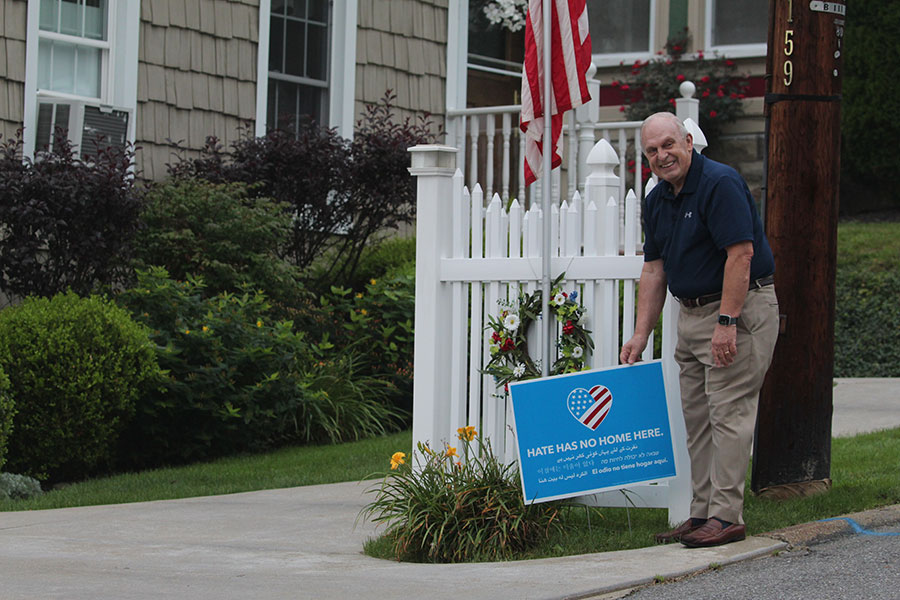Pitt-Bradford, community launch ‘Hate Has No Home Here’ campaign
Hate is not tolerated here.
The University of Pittsburgh at Bradford is joining local organizations, businesses and groups in launching the Hate Has No Home Here campaign, a national movement that identifies places that are free from hateful behavior.
The campaign includes Hate Has No Home Here signs written in a variety of languages. Several community partners have joined Pitt-Bradford in the movement, including the Bradford YWCA, the Bradford Area Chamber of Commerce and the Bradford Area Alliance.
Residents and visitors will notice these signs around Bradford, which are also on Pitt-Bradford’s campus. Additionally, a Hate Has No Home Here banner will be displayed over Main Street for the two weeks.
The Hate Has No Home Here campaign is part of a national movement that began in a Chicago neighborhood characterized by its diversity of age, race nationality and ethnicity. Schoolchildren worked with a neighborhood organization to develop a campaign to welcome all people to their community.
“The Hate Has No Home Here signs identify those places that are brave spaces for conversation, work, learning and living that are free from hateful behavior,” said Dr. Catherine Koverola, president of Pitt Bradford.
Places where the Hate Has No Home Here signs are displayed signify that hateful actions against others will not be tolerated by the person, business or organization displaying the sign.
Vanessa Castano, executive director of the Bradford YWCA, said, “Hate Has No Home Here sends a strong message not only about hate but about love. This sort of initiative can really open doors for a deeper level of communication. We need to really start talking to each other, remembering civility, without the worry of verbal attacks, and allowing people to express their own understandings and experiences.”
To that end, the YWCA is working with the First Presbyterian Church in Bradford to sponsor a discussion group around topics of race and identity.
Heidi Scrivo Passmore, executive director of the Bradford Area Chamber of Commerce, noted that inclusion is important to attracting and retaining customers and employees
“As a community, Bradford has always shown a willingness to come together,” she said. “Now is a time when we can further strengthen the connections between friends and neighbors.”
The Bradford Area School District has also joined the campaign.
Katharine Pude, school superintendent, said, “All of us in the Bradford Area School District are proud to stand with Pitt-Bradford and so many others in the community as part of this campaign.”
One of the first Bradford residents to put a sign in his front yard was Ron Orris, a Pitt-Bradford alumnus and member of its Advisory Board as well as the executive director of the Blaisdell Foundation.

Ron Orris, executive director of the Blaisdell Foundation, puts a Hate Has No Home Here sign in his yard. The University of Pittsburgh at Bradford, along with many local businesses, organizations and groups, has launched the Hate Has No Campaign, which designates those spaces where hateful behavior will not be tolerated. Orris, a Pitt-Bradford alumnus, is also a member of Pitt-Bradford’s Advisory Board.
“When I heard about this powerful campaign, I immediately wanted to be part of it,” Orris said. “I knew others would want to support it as well because the majority of people in our community welcome everyone with an open heart.”
Dr. David Fitz, Pitt-Bradford’s vice president of institutional integration and community engagement, is leading the university’s efforts.
“At its core, hate expresses itself in animosity, anger, and hostility toward persons or groups,” he said. “It leads us not to value the common humanity of those seemingly like not us. Our goal is to eradicate hatred from our community so all have the equal opportunity to grow, to learn, and to become their best selves.”
Koverola noted that posting signs is an important first step in what will be an enduring the campaign to create a welcoming environment for everyone.
“I am very grateful for all of the community’s support of this campaign because it sends a clear message to everyone that no matter who they are, what they look like, where they come from, whom they love, or what they believe, they can expect to be treated with kindness and respect in these designated spaces.
“The campaign is also meant to empower each of us to intervene when we witness hate, and we will provide training, language and tools to enable our faculty, staff and students to act.”
-- 30 --